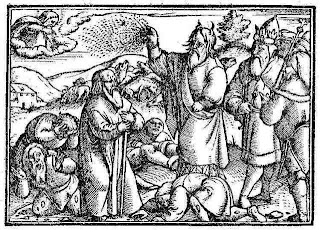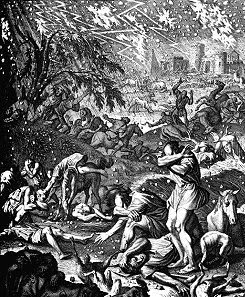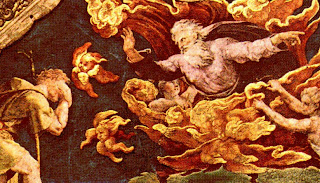The Plagues of Egypt! It's a story of how a country's leadership, determined to pursue an increasingly untenable policy despite rapidly accumulating evidence of a situation in which it can not possibly prevail, exposes citizens to hardships, injury, and death and puts ruinous long-term burdens on the national economy. This is the kind of thing that sometimes transpired in ancient times; fortunately, nothing like that could ever happen now.
Exodus is turning out to be classic Bible. It is laying out one of the most familiar and important of the Old Testament tales, with a narrative density that is.... just about what you'd expect! There is none of the hypercompression of the earlier episodes in Genesis, nor the sprawling detail of the Joseph story, but about the volume of text you might see in, say, some hypothetical Big Book of Bible Stories. And if the action is occasionally interupted for some quick laying out of family trees, that is just part of what you expect from a good Bible reading, right?
It doesn't hurt, either, that the action of today's reading follows the rhythms of our most primal literatures, such as children's storys, many song forms, and most jokes: a repeated cycle of action where each instance is a little more exagerated or severe until you finally build to a climax or resolution. The little pigs build three houses before they find a building material that's up to code. The rope gets kicked out of the bar several times before it thinks to become a frayed knot. Stan writes to Eminem three times before he drives off the bridge with his girlfriend in the trunk. And God sends ten plagues to Egypt before the Israelites are able to start their long, long hike back to the promised land.
Let's take a look.
Plagues -- the Rough Guide
I find two things really interesting about the Plagues: the reaction of the Egyptian court magicians to them (an aspect of the story that isn't generally emphasized, I'm thinking) and how Pharaoh's reactions to them are described. But before we talk about that, lets take a quick plague-by-plague survey.
Plague #1
The Unpleasantness: The Nile and all other bodies of water turn to blood.
The Magicians Respond: We can do that, too.
Damage Report: Massive fish dieoff. Water crisis requires emergency welldigging program.
Pharaonic Response: Irritation. Will not engage in dialogue.
Plague #2
The Unpleasantness: A massive infestation of frogs.
The Magicians Respond: We can do that, too.
Damage Report: Unclear. The frogs seem more of an annoyance than anything else. (Ironically, when God lifts the plague, Egypt is stuck with huge piles of rotting frogs, which almost seems worse than the plague itself.)
Pharaonic Response: Agrees to Moses' demands (that the Hebrews to be allowed several days' leave for a major religious observance out in the desert), but reneges once the frogs die.
Plagues #3&4
The Unpleasantness: Great clouds of gnats and flies.
The Magicians Respond: Whoa. Frogs we can do, but flying bugs are out of our league. Be careful, Pharaoh, this Moses guy has big guns on his side.
Damage Report: Nobody likes being swarmed by bugs. Oh, and those gnats might actually be lice, depending on who's doing the translating.
Pharaonic Response: Negotiates partial agreement to Moses' demands, but reneges again once the crisis is past.
Plague #5
The Unpleasantness: All of the livestock animals in Egypt drop dead.
The Magicians Respond: The magicians, apparently laying low after their inability to produce results during the bug crisis, do not weigh in.
Damage Report: Presumably, a near-lethal blow to the domestic economy and food supply, both directly and through loss of animal power in the fields.
Pharaonic Response: An unwavering commitment to his policy of no time off for Hebrew slaves.
Plague #6 
The Unpleasant -ness: Boils. Everyone has festering boils. (As do all of the animals, which is a little weird because, hey, didn't they all die in the last plague?)
The Magicians Respond: They
could not stand before Moses because of the boils that were on them... (9:11).
Damage Report: Ew.
Pharaonic Response: The Lord hardened Pharaoh's heart and he would not listen to Moses. (9:12) Which is interesting! In previous plagues, it was the Pharoah himself being stubborn. This time, God is
making him stubborn. Curious.

Plague #7The Unpleasantness: Pelting hail rages down throughout Egypt.
The Magicians Respond: Not mentioned.
Damage Report: Widespread injuries to humans and livestock (although, again, I thought the livestock was all.... oh, never mind). Destruction of the flax and barley crops. Major damage to orchards. Wheat and spelt crops relatively intact.
Pharaonic Response: Abject capitulation, followed by another reneging after the weather returns to normal.
Plague #8
The Unpleasantness: Swarms of Locusts
The Magicians Respond: All of Pharaoh's officials are ready to cave at this point.
Damage Report: Massive damage to all crops left standing after the hail.
Pharaonic Response: the Lord hardened Pharaoh's heart, and he would not let the Israelites go. (10:20)
Plague #9  The Unpleasant -ness:
The Unpleasant -ness: Three days of total darkness.
The Magicians Respond: None.
Damage Report: Not discussed. But, you can imagine everyone was pretty freaked out.
Pharaonic Response: Initial agreement to allow the religious celebration shot down when
the Lord hardened Pharaoh's heart, and he was not willing to let them go. (10:28)
Plague #10
The Unpleasantness: All firstborn sons of Egypt die.
The Magicians Respond: Presumably by weeping over their dead sons, like everyone else.
Damage Report: Significant blow to current and future labor force and pool of potential business, political, and religious leaders. Further loss of morale.
Pharaonic Response: the Lord hardened Pharaoh's heart, and he would not let the Isralites go out of his country. (10:28)
Magicians
The business about the magicians is interesting because they are able to keep pace with God for a while. Before the plagues start, they match Moses' trick with the staff that turns into the snake, and then they are able to duplicate the first couple of plagues. In so doing, they provide Pharaoh with some very bad intel, causing him to badly underestimate the national security risks of taking on God.
It's no surprise that God eventually outclasses the magicians. What's surprising is that there are even representatives of an alternative supernatural force involved in the first place. There's something subtly polytheistic about this, it seems to me. If God is providing the supernatural power that backs up Moses, who's backing up the magicians? It would almost have to be... like.... some other god. Wouldn't it?
God vs. the People of Egypt
I mentioned last week how peculiar I find it that God sends Moses to make demands of the Pharaoh, but also possesses Pharaoh to refuse to grant those demands. Looking at the breakdown above, you can see that Pharaoh was willing to say "uncle" after the boils (wouldn't you?), and then again after the locusts, darkness, and deaths of the firstborn -- but God won't let him. Despite the fortuitous composition of fats in the Mediterranian diet, God keeps hardening Pharaoh's heart, to the endless woe of Egyptians of all classes and occupations.
Why would God do this? Well, he actually tells Moses why, in chapter 11, verse 9: Pharaoh will refuse to listen to you -- so that my wonders may be multiplied in Egypt. God wants as big a showdown as possible, it seems, so that he can demonstrate his power and the word will get out.
This begs two questions, I think. One is, why does the demonstration of power have to be a demonstration of destructive power? Couldn't God make his point by, say, making the crops superabundant, while special cows that yielded ice cream suddenly appeared throughout the land? Or if that is too over the top, don't you think he could have got impressive results through a simple program of detailed skywriting?
The other questions is, why does God want the Egyptians to be impressed with him? Is he after new worshippers? That doesn't seem likely; you wouldn't normally try to draw people into your sphere by destroying their food supply and whacking their kids. No, this seems to be more about exposing the humiliating helplessness of the Egyptians. Which kind of implies -- this might be a stretch -- a humiliation of the gods whom the Egyptians relied on for protection. Which gets us back to that whole polytheism thing again. Curious and curiouser.
Next week: Let's Go! Sinai.
 Note: I had better clarify that the title of this post is a lame play on the name of the great early 90s Lawrence, Kansas band Plague of Daisies, of which I was the guitarist and lead long-haired dude (as shown here, at right). Sometimes you just have to be your own pop culture reference.
Note: I had better clarify that the title of this post is a lame play on the name of the great early 90s Lawrence, Kansas band Plague of Daisies, of which I was the guitarist and lead long-haired dude (as shown here, at right). Sometimes you just have to be your own pop culture reference. 




%2520l.jpg)







.gif)


